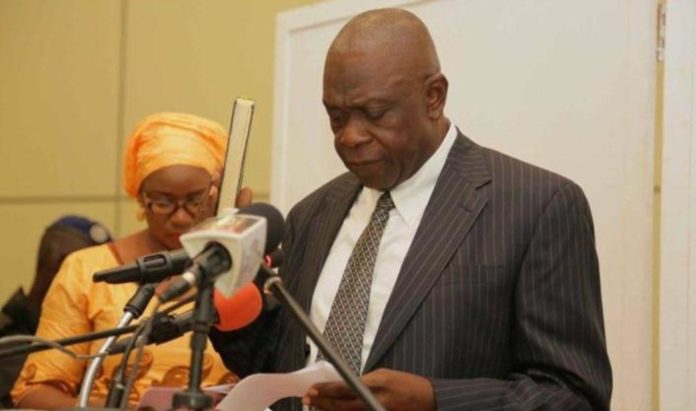By Yankuba Jallow
The Supreme Court of the Gambia is set to rule on the criminal appeal involving Amadou Sanneh, the Minister of Trade who was pardoned by President Adama Barrow on 30th January 2017.
The issue before the Supreme Court is to determine whether a presidential pardon can quash conviction and sentence.
The Minister of Trade Amadou Sanneh, who also doubles as National Treasurer of the United Democratic Party (UDP), was sentenced to five years imprisonment in December 2013, for his role in supporting an asylum application of some Gambians. He was released from prison by a presidential pardon given by current President Adama Barrow. Sanneh was released on the 30th January 2016 from Mile II Prison after serving three of his five year jail term. Amadou Sanneh, together with Malang Fatty and Sambou Fatty, were convicted and sentenced to five years in jail on two counts relating to sedition. Sanneh was accused of issuing ‘malicious documents’ to facilitate asylum for Malang and Sambou Fatty. He denied the allegation but the then High Court Judge in the person of Justice Emmanuel Nkea, found him guilty and sentenced him to five years in jail.
Whilst serving his sentence, Sanneh was granted presidential pardon by President Adama Barrow and later appointed Minister of Finance and Economics Affairs, before being redeployed to the Ministry of Trade.
When the case was called on Tuesday March 12th 2019 before Supreme Court Judges, Counsel MB Abubakar announced his representation for the State whilst Lawyer Rachel Y. Mendy, represented the appellant (Amadou Sanneh).
Counsel Abubakar in his submission before the panel of judges of the Supreme Court, said a presidential pardon can wipe out both conviction and sentence. Abubakar told the Court that both parties in this suit want the matter to be struck out.
On his part, Lawyer RY Mendy responded that they have conceded to the position of the State. She urged the Court to strike out the suit. She inclined herself with the submission of State Counsel Abubakar that a presidential pardon can wipe out criminal conviction and sentence.
Later in the trial and after consultation with her client, Lawyer Mendy changed position and submitted that the Court should rule on the matter, based on law.
“We would still concede to the briefs of the State, but will maintain our position as stated in our briefs,” Lawyer Mendy told the Court.
Following questions by the Justices of the Supreme Court, Lawyer Mendy indicated thus: ‘‘I will withdraw my position and we will proceed with the briefs.’’ The Supreme Court Judges in their holding brought in two positions; that if the appellant concedes and wants the matter to be struck out of Court, the Court will strike it out; but if the appellant wants the Court to rule on whether a presidential pardon can wipe out conviction and sentence or not, she should come out formally. The appellants Lawyer chose the second option which is for the Court to rule on whether a presidential pardon can wipe out conviction and sentence.
The matter was adjourned and the date will be communicated to both parties.
Readers could recall that the Gambia Court of Appeal on November 2nd 2017, had ruled on application brought by Lawyer Ousainou Darboe and 18 others’on a similar issue.
The lead Judge of the Gambia Court of Appeal Justice Awa Bah in her ruling, said the President in pursuance of his powers vested under Section 82 (1) of the 1997 Constitution, granted pardon to the Appellants (Lawyer Darboe and 18 others) on 30th January 2017, by way of Gazette contained in General Notice No. 4/2017 Vol. 134.
In her ruling, she held that the President in the exercise of his Constitutional powers pursuant to Section 82 (1) of the Constitution, could not have reversed the decision of the High Court convicting the Appellants of the offences stated therein.
“That power to reverse their conviction is a judicial power and lies only with the Court,” she said.
She held that the President can only grant pardon to the Appellants, and relieve them of all pains or penalties and punishments whatsoever, that the conviction may ensue.
“The grant of the pardon could not wipe out the fact of the conviction of the Appellants, which conviction could not be denied,” she said.
Meanwhile, the appeal of Ousainou ANM Darboe will be heard today before the Supreme Court. Darboe is the Vice President of the Gambia, and is represented in Court by Neneh M.C. Cham.


















